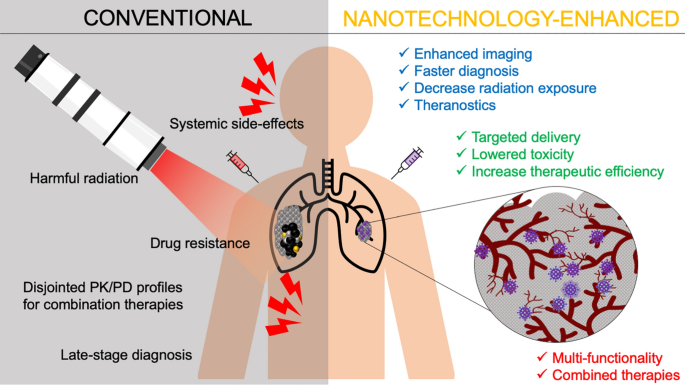Nanomedicine is a medical science based on using nanotechnology to treat various diseases and disorders. Nanomedicine can cure several cancers, especially the brain, blood, and skin.
Cancer is a disease that affects millions of people across the world. It is the second leading cause of death after cardiovascular diseases. However, not all patients are willing to go through the treatment options. In such cases, a better option is to opt for alternative treatments which are less expensive and more affordable. One of the most effective alternative treatment methods for cancer is mRNA cancer vaccines.
With the advancement of nanotechnology, scientists are now working to develop drugs and devices designed to target specific tumors and destroy them. In recent years, Nanomedicines for cancer therapy have significantly treated several types of cancers.
Nanomedicine has its advantages, but it is also associated with some disadvantages. Let’s take a look at the pros and cons of nanomedicine.
Advantages of nanomedicine
Nanomedicine is an essential component of today’s medical practice because of its ability to zero in on a specific tumor and eradicate it. Additionally, it can specifically target cancer cells and kill them while leaving normal cells unharmed.
It is well known that nanomedicine can assist in diagnosing cancer because of its ability to identify the presence of a tumor. Additionally, it can assist in determining the type of cancer present, and it can also be used in treating specific cancers in a targeted manner.
The presence of a tumor can be detected with the assistance of nanomedicine, which can also help diagnose cancer. Additionally, it can assist in determining the type of cancer present, and it can also be used in treating specific cancers in a targeted manner.
The presence of a tumor can be detected with the assistance of nanomedicine, which can also help diagnose cancer. Additionally, it can assist in determining the type of cancer present, and it can also be used in treating specific cancers in a targeted manner.
We can conclude that nanomedicine is a very significant and cutting-edge form of technology that has been instrumental in the advancement of medical practice. There are a lot of positive aspects to it, but there are also some negative aspects. Therefore, before utilizing nanomedicine, discussing its benefits and drawbacks is best.
The era of personalized medicine is being ushered in by the effectiveness of targeted anticancer nanomedicines against some advanced blood cancer types. Further molecular analysis of blood tumor specimens will help reveal these tumor-specific targets for the best nano-therapy.
The Role of Nanomedicine in cancer treatment
We are all aware that cancer is a disease that can quickly lead to death and that it is notoriously difficult to treat. A wide variety of medications can be utilized in the treatment of cancer; however, the degree to which each is successful is not currently known. Surgery, radiotherapy, and chemotherapy are all viable treatment options for cancer; however, none of these approaches is likely to eradicate the disease.
Chemotherapy and radiotherapy are the two primary forms of treatment that are utilized most frequently in the fight against cancer. However, these treatments will result in the death of healthy and cancerous cells. Because of this, the patient will experience various adverse effects, all of which will render them fragile and helpless.
Patients battling cancer who are being treated with chemotherapy and radiotherapy must continue taking their prescribed medications for an extended period. Because of this, the individual’s immune system will become compromised, posing a risk to the entire body.
The study of the nanoscale and the application of nanoparticles in medicine are the two primary tenets of the emerging field of nanomedicine, a relatively recent field of research. The term “nanoparticle” refers to any substance smaller than one micrometer in size.
Conclusion
In conclusion, nanomedicine is a new technology that will make cancer treatment more accessible. It will make the drugs more effective and not affect the healthy cells. Thus, it will not make the patients weak and vulnerable.

